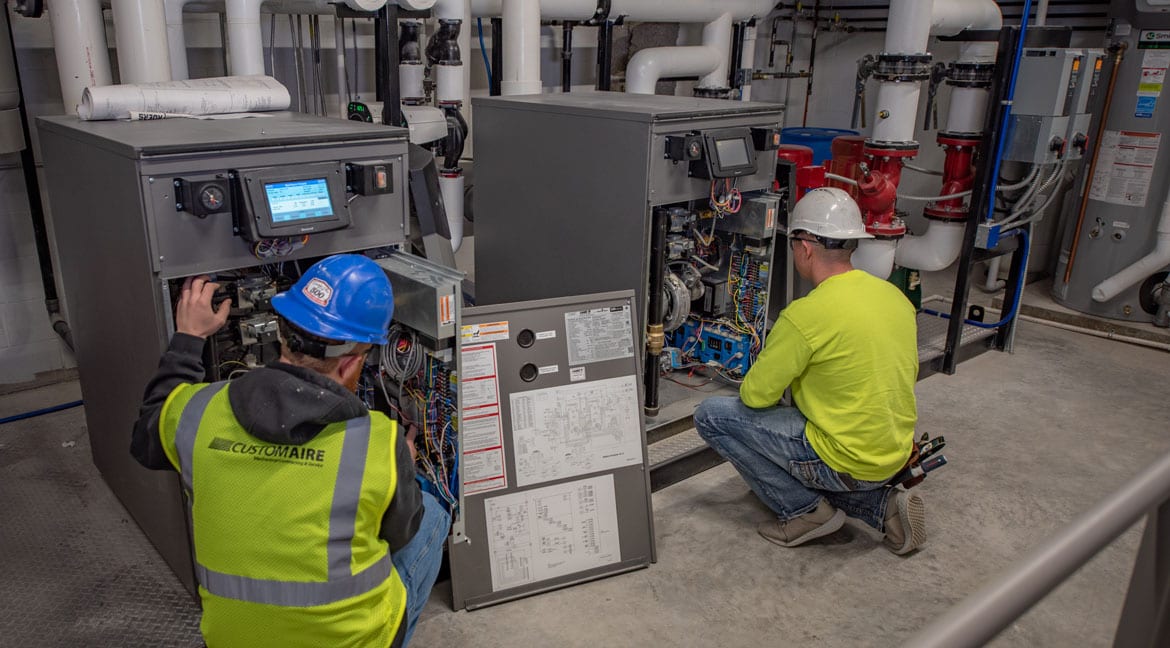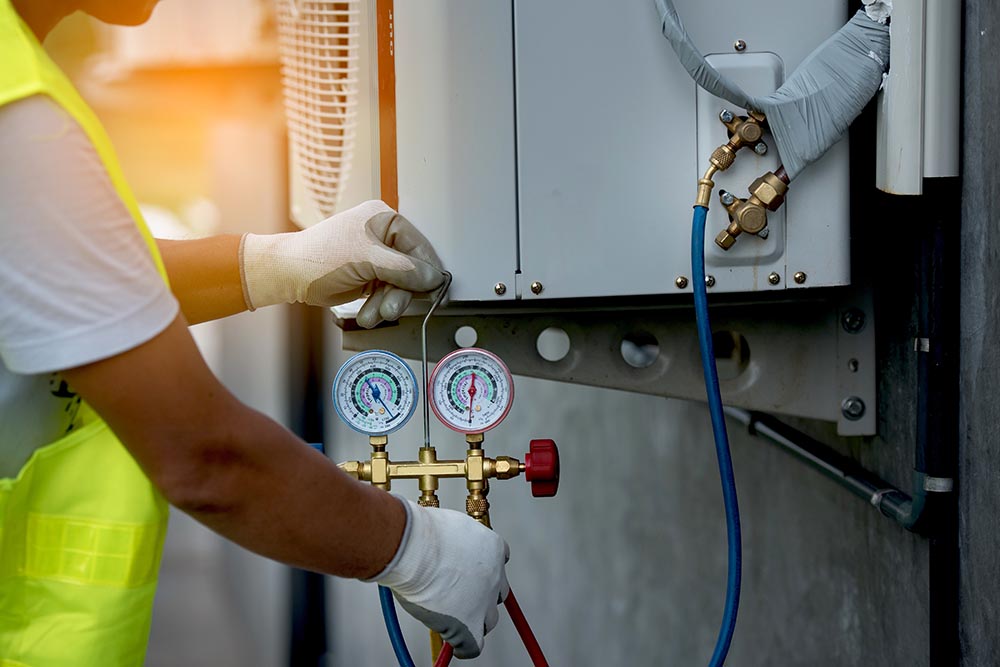Everything You Should Know Before Installing ductless mini splits
Everything You Should Know Before Installing ductless mini splits
Blog Article
Picking In Between a Heatpump and Furnace: Key Considerations for Your Cooling And Heating Requirements
When evaluating heating options for a/c needs, the choice between a heat pump and a heating system can be complicated. Each system supplies distinctive advantages customized to details environments and power performance objectives. Comprehending these distinctions is essential for making an educated choice. Key elements such as installation costs and environmental impact even more complicate the choice process. Which option really aligns with one's convenience and sustainability choices? The complying with areas will check out these considerations carefully.
Recognizing Warm Pumps: Just How They Work and Their Benefits
While lots of home owners take into consideration different heating alternatives, recognizing just how warmth pumps function and their advantages can greatly affect their decision. Heatpump run by transferring warmth as opposed to generating it. In the winter, they remove warm from the outdoors air or ground and transfer it inside, while in the summertime, they reverse this procedure, cooling the home by removing warm outside. This dual capability makes them versatile for year-round climate control.One of the key benefits of heatpump is their power effectiveness. They use substantially much less electrical energy compared to conventional heating unit, potentially resulting in reduced utility expenses (furnace replacement). Additionally, warmth pumps have a smaller carbon footprint, making them an eco-friendly choice. They additionally require less maintenance than standard systems, adding to long-lasting price savings. Generally, understanding the mechanics and advantages of heatpump can assist home owners make informed decisions concerning their home heating and cooling demands
Discovering Furnaces: Kinds, Procedure, and Benefits
Heaters come in different kinds, consisting of gas, electric, and oil models, each with unique operational systems. Comprehending these distinctions is crucial, as they affect performance and home heating efficiency. In addition, furnaces offer numerous advantages, such as consistent heat result and reliability in colder environments.
Types of Heating systems
Heater can differ substantially in style and operation, with heating systems being a prominent choice among property owners. There are a number of sorts of heaters, each making use of different fuel resources and technologies. Gas heaters are usual, leveraging all-natural gas to create warm efficiently. Electric furnaces, on the various other hand, make use of electric resistance to generate heat, usually preferred for their uncomplicated setup. Oil furnaces, while less common, are reliable in areas with limited gas gain access to (heat pump replacement ooltewah tn). Additionally, condensing heaters make best use of energy efficiency by catching and recycling exhaust gases. Each kind operates through a system of warmth exchangers and ductwork to distribute cozy air throughout a home. Comprehending the distinctions in between these heating system kinds is vital for educated a/c choices
Benefits of Heating systems
For property owners looking for reliable warmth throughout cold months, the benefits of furnaces are substantial. Heaters supply consistent heating, making certain even temperature levels throughout the home. They are particularly effective in severe cool, commonly outmatching warm pumps in icy problems. Numerous kinds, including gas, electric, and oil heating systems, supply flexibility to satisfy varied needs and preferences.Furnaces also have a tendency to have reduced first installment prices contrasted to heatpump, making them a more easily accessible alternative for many. Their robust design adds to a longer life expectancy, with several units lasting over 15 years with correct upkeep. In addition, modern furnaces are typically geared up with sophisticated technology for boosted efficiency, which can lead to lowered power expenses. Generally, heating systems stay a trustworthy option for effective home heating.

Power Performance: Comparing Heat Pumps and Furnaces
When comparing energy effectiveness between heatpump and heating systems, the Seasonal Energy Effectiveness Proportion (SEER) plays an essential role in determining performance. Furthermore, an operational expense evaluation discloses the lasting financial ramifications of each system. Comprehending these elements can assist house owners in making informed choices concerning their home heating options.
Seasonal Energy Efficiency Proportion
Energy effectiveness plays a vital function in the decision-making process between heatpump and furnaces, especially when taking into consideration the Seasonal Power Performance Proportion (SEER) This metric steps the cooling efficiency of heatpump over a whole cooling period, offering a standardized means to review performance. Higher SEER rankings suggest better power effectiveness, translating to lower power consumption and minimized energy expenses. On the other hand, heating systems are typically analyzed utilizing the Yearly Gas Application Performance (AFUE) score, which reflects heating efficiency. When contrasting these 2 systems, property owners must prioritize SEER rankings for heatpump, as they directly influence overall power financial savings and environmental sustainability. A comprehensive understanding of SEER can especially affect the long-term fulfillment and cost-effectiveness of the picked heating and cooling solution.
Operational Cost Analysis
Recognizing the functional prices connected with warm pumps and furnaces is essential for property owners evaluating their choices. Warm pumps typically provide greater power efficiency, transforming electrical power right into warmth with marginal waste. This causes lower month-to-month energy expenses, particularly in moderate climates. On the other hand, conventional heaters, particularly gas versions, may have lower ahead of time costs yet can incur higher functional costs in time as a result of sustain costs and performance ratings.Moreover, heatpump can work as both heating and cooling systems, potentially reducing the need for separate cooling and heating devices. While first investments for warmth pumps may be higher, their long-lasting financial savings in power effectiveness can make them a more cost-effective selection for many houses. Cautious evaluation of neighborhood energy prices is necessary to figure out the very best option.
Setup Costs: What to Anticipate for each and every Furnace
Installment costs for furnace can differ substantially between heatpump and heaters, influencing property owners' choices. Heat pumps usually have higher ahead of time installation expenses, generally varying from $3,500 to $8,000, depending upon the device size and intricacy of installment. This includes the exterior unit, indoor handling system, and necessary ductwork adjustments. On the other hand, furnaces often tend to have lower preliminary prices, averaging between $2,500 and $6,000, which can be appealing for budget-conscious house owners. Setup expenditures can raise if comprehensive ductwork is required.Moreover, the selection of gas kind for furnaces-- natural gas, lp, or electric-- can additionally impact setup expenses. While warmth pumps offer power performance, their initial investment may discourage some purchasers. Eventually, reviewing installment costs along with lasting financial savings and performance will assist property owners in making notified choices regarding their home heating systems.
Environment Factors To Consider: Which System Executes Much Better in Your Location
Just how do environment conditions affect the performance of home heating systems? The performance of warm pumps and heating systems can vary considerably depending upon the regional environment. In moderate environments, heatpump stand out by efficiently transferring warmth from the outdoors air, making them an energy-saving option. Nonetheless, their effectiveness decreases in incredibly cold temperatures, where they may battle to extract enough warm. Alternatively, heating systems, especially gas models, give constant and trusted warmth despite exterior conditions, making them better in chillier regions.In locations that experience milder wintertimes, heat pumps can run properly year-round, offering both home heating and cooling. On the other hand, areas with harsh wintertimes frequently take advantage of the robustness of heating systems. Inevitably, understanding the regional environment is essential when making find out a decision in between a heat pump and a furnace, as it straight affects their operational performance and overall performance.
Maintenance Demands: Long-Term Take Care Of Heat Pumps vs. Furnaces
While both warmth pumps and furnaces require normal upkeep to guarantee peak performance, their specific demands and treatment routines vary significantly. Heating systems normally need less constant interest, with annual evaluations sufficing to look for gas leaks, tidy filters, and analyze general functionality. Their less complex style frequently allows for simple repairs.In contrast, heatpump require biannual upkeep because of their dual duty in cooling and heating. This consists of cleaning coils, examining refrigerant degrees, and guaranteeing that both the outside and indoor systems operate at their best. Additionally, heatpump maintenance frequently entails more complex elements, making professional servicing essential.Neglecting upkeep can result in lessened efficiency and raised energy costs for both systems. Inevitably, homeowners ought to think this page about these long-term treatment requirements when picking between a heatpump and a furnace, as positive upkeep can expand the life expectancy and efficiency of either system considerably.
Environmental Impact: Selecting a Lasting Home Heating Option
The environmental effect of heating unit is an important analysis for home owners looking for sustainable choices. Heatpump are usually extra energy-efficient than traditional heating systems, as they transfer warm as opposed to produce it, greatly minimizing carbon emissions. By using renewable resource sources, such as geothermal or air-source warm pumps, property owners can additionally lessen their environmental footprint.On the other hand, gas heating systems send out greenhouse gases and add to air contamination, though they usually give higher warmth outcome. Advancements in innovation have actually led to the advancement of high-efficiency heating systems that minimize emissions.Ultimately, picking a home heating system includes considering effectiveness against ecological effect. Homeowners are motivated to assess local power sources and rewards for eco-friendly systems, guaranteeing a choice that aligns with both individual convenience and environmental duty. The decision influences not only instant comfort however additionally long-lasting sustainability and ecological health.
Often Asked Questions
The Length Of Time Do Warm Pumps and Furnaces Usually Last?
The lifespan of warm pumps commonly ranges from 15 to two decades, while furnaces can last between 15 to thirty years. Normal upkeep substantially affects their durability and performance in offering home heating solutions.
Can I Use a Warmth Pump in Extremely Cold Climates?
Heat pumps can operate in very cool climates, but their effectiveness reduces as temperature levels decline. In such problems, supplementary home heating resources may be essential to maintain comfy indoor temperature levels and assure peak efficiency.

What Is the Noise Level of Warm Pumps Versus Furnaces?
The sound levels of heatpump and heating systems differ significantly. Usually, heat pumps run more silently than traditional furnaces, making them better for those delicate to appear, while furnaces might generate louder functional sounds throughout home heating cycles.
Are Warmth Pumps Suitable for Both Cooling And Heating?
Heat pumps are undoubtedly appropriate for both home heating and cooling (furnace replacement). They work by moving warmth, giving reliable temperature level control year-round, making them a functional selection for home owners seeking an all-in-one HVAC option
What Size Heating Unit Do I Required for My Home?
Determining the suitable size heater for a home calls for assessing factors such as square footage, insulation high quality, regional climate, and the home's format. Consulting a specialist can guarantee a precise analysis and perfect convenience. Warm pumps generally provide greater energy effectiveness, converting electrical energy right like this into warmth with very little waste. In modest environments, warm pumps excel by effectively transferring heat from the outdoors air, making them an energy-saving option. Conversely, furnaces, especially gas models, give reliable and constant warm regardless of outside problems, making them preferable in chillier regions.In locations that experience milder winters months, heat pumps can run effectively year-round, providing both heating and air conditioning. Heat pumps are normally much more energy-efficient than typical furnaces, as they transfer warmth rather than produce it, substantially decreasing carbon exhausts. By utilizing sustainable power sources, such as geothermal or air-source warmth pumps, property owners can further decrease their ecological footprint.On the other hand, all-natural gas heating systems emit greenhouse gases and contribute to air contamination, though they frequently supply greater warmth result.
Report this page